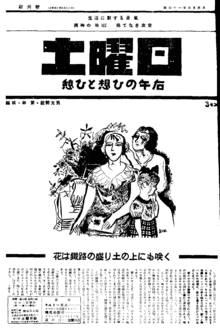Masakazu Nakai
Masakazu Nakai (中井 正一, Nakai Masakazu, alternative romanization Nakai Shōichi[1]) (14 February 1900 - 18 May 1952) was a Japanese aesthetician, film theorist, librarian, and social activist.

Career
Born in Hiroshima Prefecture, Nakai studied philosophy at Kyoto University, particularly aesthetics under Yasukazu Fukuda.[2] He started the dōjinshi Bi hihyō in 1930, which changed its name to Sekai bunka in 1935.[2] He became a lecturer at Kyoto University while being active in left-wing social movements, protesting Japan's tilt towards fascism and promoting popular forms of culture through such concepts at the "logic of the committee."[2]
He founded the popular culture tabloid Doyōbi (Saturday) in 1936, but was arrested for his activities in 1937 and lost his university position.[2] After World War II, he continued his political activism by teaching philosophy as part of the Hiroshima Culture Movement and by running for governor of Hiroshima Prefecture, only losing by a narrow margin.[3] He was appointed the first Vice Librarian (fukukanchō) of the National Diet Library in 1948.[2]
Selected bibliography
- Nakai, Masakazu (1981). Nakai Masakazu zenshū (in Japanese). Bijutsu Shuppansha.
- Nakai, Masakazu (December 2010). "Film Theory and the Crisis of Contemporary Aesthetics". Review of Japanese Culture and Society. 22: 80–87.
References
- Iwamoto, Kenji. "Film Criticism and The Study of Cinema In Japan: A Historical Survey (PDF) Archived 2011-08-13 at the Wayback Machine". Iconics vol. 1 (1987). Accessed 28 November 2009.
- "Nakai Masakazu". Nihon jinmei daijiten + Plus (in Japanese). Kōdansha. Retrieved 12 January 2011.
- Leslie Pincus, "A Salon for the Soul: Nakai Masakazu and the Hiroshima Culture Movement," positions 10.1 (2002), pp. 173-194.
External links
- Nakai Masakazu at Aozora Bunko (in Japanese)